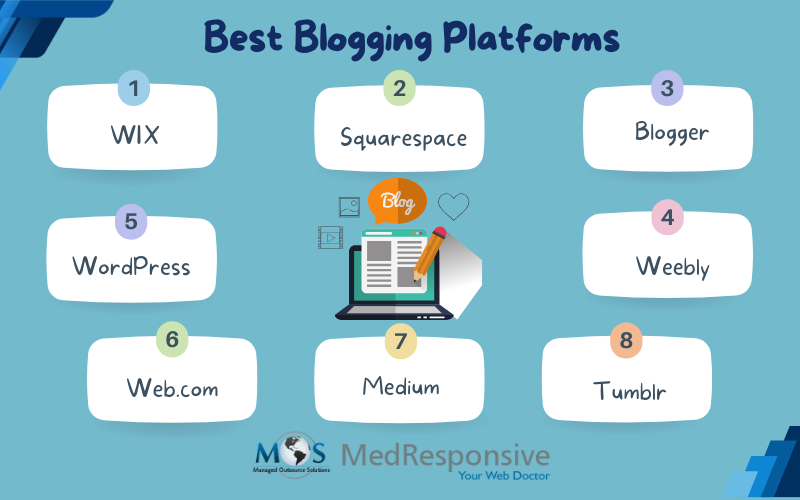Using blogs as part of a marketing strategy is a great way for businesses, regardless of size or type, to connect with present or potential customers. Customers can find your business more easily through Google if you have a blog. Additionally, blogs let customers learn more about a business and its products and services. Businesses can rely on an outsourcing SEO company that provides content writing services to produce and publish successful blogs.
Popular Blogging Platforms
Choosing the ideal blogging platform for your needs is the first step towards creating a successful blog. Managing a blog can be made simple with the appropriate tool, which may help with anything from website creation and content management to audience growth. Certain blogging platforms prioritize simplicity by providing merely basic publishing and design options. Some favor complete customization, enabling consumers to change every element of their website. Below listed are some of the well-known blogging platforms.
- WIX: Wix is a free online website design platform that supports blogs. Today, almost 190 countries with 150 million people use this software. It is the best option for beginners or people with less technical knowledge. The aim of the creators of WIX is to empower people who want to create their own website with zero technical and coding knowledge, and design skills. It has a drag and drop element that allows you to manipulate text, images, videos, apps and so on. It has both paid as well as free plans. The features of the free version include:
- Up to 500MB storage and bandwidth
- Customer-friendly approach
Pros:
- Can view the outcome of your blog before clicking ‘publish’ button
- Can make changes on your page
- Easy to handle
- Over 800 in-built templates for blogging
- Embedded with stock photos and videos
- Can write and edit on mobile phones as well
Cons:
- Wix branding and ads on your website
- No monetization
- Limited blogging function
- No changes can be made in templates
- Lack of customization options
- Limited number of images and text
- Squarespace: Squarespace is ideal for visual-based businesses like photographers, designers and artists. It allows businesses to create blogging sites with great perfection even without hiring a graphic designer. However, the site builders have to pay a small amount on a monthly basis. It offers more freedom for customization than WIX but less than WordPress. It is easier to handle than WordPress. Squarespace has a set of elegant templates which gives a beautiful face to your blog. Another advantage is that the users can control the color palette as well as layouts. The features of Squarespace include:
- Free blogging templates
- Built-in post scheduler
- In-depth analytics
- SEO and social media tools
- Mobile app
- Email marketing tools
- Integrated with Getty images, Unsplash and Google AMP
Pros:
- Highly responsive 24*7 customer service system
- No maintenance required
- All add-ons and third-party extensions are in-built
- Easy e-commerce functionality
- Over 150 layouts that are mobile-friendly and fully customizable.
- Designer-friendly fonts and stickers.
- You can connect to other social media platforms after posting the content on it.
- In-built analytics tool for analyzing incoming traffic to the website and also their interaction with the content.
Cons:
- Limited features and functionality
- Blogger: Owned by Google, this is a great option for people who have a flair for writing and want to take up blogging as a hobby. It offers the same level of dependability and navigation as Chrome and Gmail. It is free software where you can include your own sub-domain. You can use a custom domain name when setting up your blog on Blogger, including it as a subdomain of your website. Though it has limitations for business purposes, it is an ideal option for personal use. It takes only very little time to set up your account. Google takes care of hosting, storing your files, and your site’s speed. The features of Blogger include:
- Images can be stored in Google photos
- Has integrated Ad campaigns
- Has a simple and easy text editor
- Has free SSL certification and free domain mapping
- Integrated with Google
- You can view your blog presentation before posting
- It doesn’t have vendor ads
- Multiple options for customizing blog
- Has a number of fonts
- Can upload pictures and videos
- Can add HTML code for greater customization
- Can design your own templates
- Can integrate with Google analytics
Pros:
- Free
- Has a monetization option
- Create and customize easily
- You only need a Google account for setting up a blog
- Can be optimized with AdSense
Cons:
- You don’t own your content as Google owns Blogger
- Not as user-friendly as other options
- Has limited options for customization
- Outdated interface
- Less content management features
- Can’t install plugins
- Can’t change the default settings
- Can’t change the display of the content
- Weebly: It is another popular option for blogging platforms. It is a really nice option for people who want to work with a free website builder. This user-friendly platform has features like drag and drop similar to WIX. It is a perfect option if you want everything under one umbrella as it has building tools, templates and hosting. Weebly ensures easy handling of e-commerce blogs. Through this blogging platform, people have the option to sell items physically and digitally. However, the free version does not support monetization. The features of Weebly include:
- Free SSL security
- 500MB storage capacity
- Chat and e-mail support
- Community forum
Pros:
- Can create complex layouts
- Completely free for a free version
- No charges for domain or hosting for a free version
- Easy to handle
- Can optimize on devices like mobile
- More features and customization options than WIX
- Can include more sub-levels for navigation menus. Thus, can arrange larger content in a well-organized manner
- Can change themes easily
- Has e-commerce options
- Has lots of themes that can be edited with page builder
Cons:
- The URL may have Weebly branding
- Weebly ads on your site
- Limited customization options compared to WordPress
- Has more basic functionalities
- Can’t access source code
- The premier plan is costlier than WordPress
- Tumblr: This micro-blogging site is a blend of blog and social media channels with in-built tools like sharing, re-blogging and following. Tumblr currently hosts 476 million blogs. Tumblr has been purchased by WordPress owned company Automatic. As it has the essence of the social media channels, this platform offers interesting ways to share the content, making it popular among the younger generation. It has the option for following people as well as re-blogging the content like sharing on Facebook and retweeting on Twitter. It acts as a bridge between conventional blogging and social media platforms. The platform describes itself as the place where you can get everything you need. It is a great choice for people who want to produce relatively quick and short content without any kind of setback. However, it is not ideal for people who want to own a blogging site for themselves. This platform is also not as e-commerce friendly as Weebly. At the same time, you can use this platform for personal purposes completely free.
Pros:- Can add multiple pages, sidebar, social media sharing buttons, comment section and so on.
- Has hundreds of free as well as premium themes
- A vibrant place to exhibit creativity
- No payments for posts
- Most features are free except for a few
- Offers a number of ways including Google AdSense for generating money
- Can create and publish photos, GIFs, links, chat dialogue boxes, audio-video files and so forth
- No word restrictions
Cons:
- Has no control over changes
- You get access to certain features only if you turn to ‘Subscriber content’
- People who re-blog your content have the option to edit it in their own way
- Limited options for customization
- There are certain limitations like a certain number of per day posts
- Can only upload videos under 100MB in MP4 format
- Can only track about 20 tracks at a time
- Medium: Medium is a cross between a blogging platform and social network. With more than 100 million monthly active users, it provides aspiring writers with the chance to quickly increase the visibility of their work. In contrast to other free blogging services, Medium emphasizes simplicity. Since each profile uses the same template, there is no need for labor-intensive design work, allowing bloggers to concentrate on producing content. Having said that, you can customize the blog site by altering the colors and adding your logo. Medium is widely used by prominent personalities and content providers to establish their internet presence.
Pros:- It costs you nothing
- Getting started is quick and easy, with no technical skills required
- It’s a great way to test your content before building your own blog
Cons:
- You’re highly reliant on Medium’s website audience and algorithm
- You don’t own your domain name
- You can’t run your own ads
- Web.com: It is a well-liked and reasonably-priced site builder with an integrated blogging platform. You don’t need any technical expertise to get started because of the simple drag-and-drop builder and hundreds of beautifully designed website themes. Everything you need to launch a business blog is there, including hosting, a business email address, and a free domain name. It also provides security, autosave and backup, website analytics, SEO tools, and more.
Pros:- A simple drag-and-drop builder that makes customizing your design easy.
- Hundreds of pre-made themes for websites.
- Pre-made content blocks, such as banner ads, picture galleries, and more.
- Millions of free stock photos are available for use on your blog.
- Simple setup because Web.com manages every technical detail of your website’s hosting.
Cons:
- The blogging functionalities are comparatively weaker than those of WordPress.org.
- You can’t utilize as many third-party plugins as WordPress because there aren’t as many apps and extensions available.
- Since Web.com is a proprietary website builder, it would be challenging to move your blog to another platform in the future.
- WordPress: WordPress is considered the ‘King’ of blogging platforms. It is a simple platform for creating blogs and websites. About 43% of the total number of websites are powered by WordPress. It has an open-source content management system. The main advantage of WordPress is that anyone can modify WordPress software for free. Also, anyone can create a website on this platform even if the person has no technical knowledge. Initially, it started as a platform for creating blogs. However, later it updated the core code and became an ecosystem for a large number of plugins and themes. It is also a popular option for creating e-commerce platforms. With WordPress, people can create business websites, e-commerce stores, blogs, portfolios, resumes, forums and so on.
Pros:- Easy handling
- Unlimited options for pages, posts and so on
- Flexibility in post scheduling
- Can restore deleted pages
- Can add additional website editor easily
- Managed website security system
- Updated core code and plugins
- Automatic backups
Cons:
- You need a lot of plugins for accessing additional features
- Have to make payments for accessing some features and plugins
- Frequent updating in themes and plugins
- Page speeds are often slow
- Low SEO ranking
- Limited SEO optimization options
- High chance for hacking and spamming
- Security plugins are not adequate to protect the website
There are two versions of WordPress: WordPress.com and WordPress.org.
- WordPress.com: This is the first version of WordPress, which is suitable for people who want to make blogging a hobby and don’t attach importance to monetization.
- WordPress.org is a self-hosted version of WordPress. You have to find a host and do backups and maintenance on your own.
Here are the key differences between WordPress.com and WordPress.org:
| WordPress.org | Contact |
|---|---|
| Hosted Version | Self- hosted version |
| Limited support to themes | Full support to themes |
| Plugins are not allowed | All plugins are allowed |
| Free to use | Have to pay on a monthly basis to get access to certain features |
| No option for customization | Can customize according to the users |
| Limited or no monetization options | Have options for monetization |
| Have to make payments or remove WordPress branding from the domain | Can customize domain accordingly without using WordPress branding |
| Limited SEO features | Incorporated SEO features |
| Has limitations in analytics | Has powerful analytics |
| No e- commerce option | Can set up an e-commerce store |
| No maintenance available | Has maintenance option |
For businesses seeking to enhance their online presence and engage customers effectively, consider our content writing services.
Do you want to enhance your blogging game? Read our blog post Boost Your Business Blogging Efforts with Content Writing Services
For people with a knack for writing, blogging platforms are their go-to place online. Blogging platforms give users the chance to showcase their writing abilities while advertising their businesses. Whatever free blogging platform you choose will depend on your demands. These platforms now have enhanced functionalities to meet the demands of e-commerce. Collaborating with a professional organic SEO service provider is the best option to produce excellent content for blogging platforms that will advertise your goods and services.





